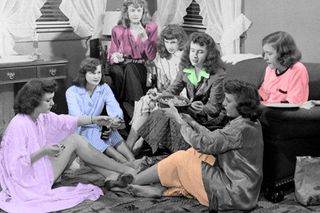
Anxiety, Sadness Can Be the Glue for Some Teenage Friendships
A struggling teen isn’t necessarily a lonely one.

The teen years are not easy ones. They bring a new importance to friendships, as well as more complex social interactions, which aren’t always good. Peer pressure, bullying, a need to fit in and more can contribute to common mental health issues. But how do these issues then affect friendships? A new study looks into just that, finding truth in the old saying: misery loves company.
“An important takeaway from our study is that children’s personal struggles need not adversely impact their social relationships,” says Brett Laursen, PhD, a professor in the department of psychology, in Florida Atlantic University’s College of Science. “Mental health issues do not necessarily ruin chances of making and maintaining worthwhile friendships.”
Published in the Journal of Research on Adolescence, the study explored the same-sex friendships of nearly 400 teenage students, starting from roughly age 13 , till the end of high school in 12th standard. Researchers also tracked the students’ mental health, through peer-, teacher- and self-reports of symptoms associated with anxiety and depression.
The presence of these symptoms didn’t predict how long a friendship would last, but the degree to which both teens involved in the friendship experienced the same symptoms did. The team found that differing levels of anxiety and depression led to more instability in the relationship, making it more likely to end. However, teens who were on similar levels, emotionally, were more likely to have an enduring friendship.
“Behavioral similarity is tremendously important to a friendship,” says Laursen. “Shared feelings and shared experiences are the glue that holds a friendship together.”
Over all, this held true for friendships regardless of teens’ gender. Among girls, however, there was an exception: Different levels of passiveness — that is, the behavior of avoiding conflict, not saying what you really mean or not vocalizing needs — between two friends signaled their relationship was more likely to last. For boys’ friendships, different levels of passiveness, increased instability in friendships in the same way as differing levels of other depressive symptoms.
Laursen says boys are socialized to be more competitive and confrontational in interactions with friends, and different levels of passiveness might be a liability in the kinds of activities boys are encouraged to engage in together, like sports and games.
“Compared to boys, girls tend to favor extended dyadic exchanges, and so they may respond to submissive behavior with support and empathy, which may strengthen friendship ties,” he says.
What this boils down to is compatibility, Laursen says. People with shared experiences and similar emotions are more likely to stick together. He suggests if struggling children are also struggling with friendships, a point of guidance for them might be to look for the like-minded.
“Too often, dissimilar friends become former friends,” he says.
Related:
Related


Why Some People Have More Bad Dreams Than Others
